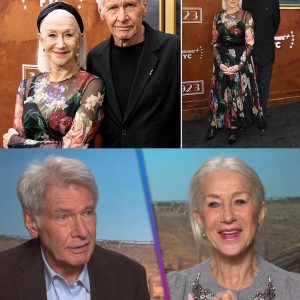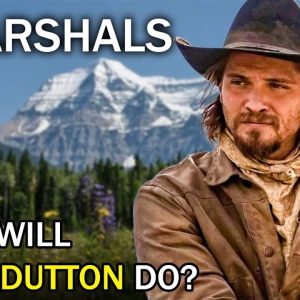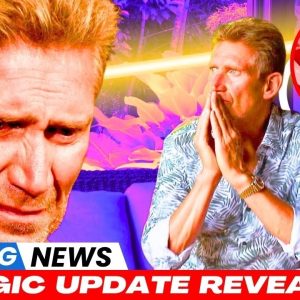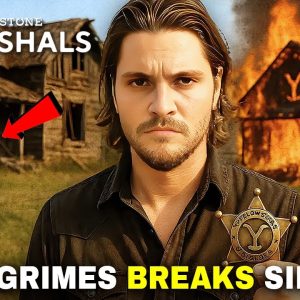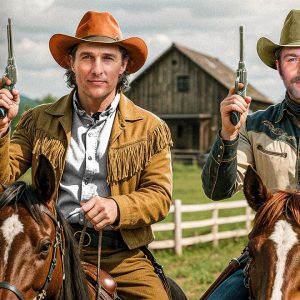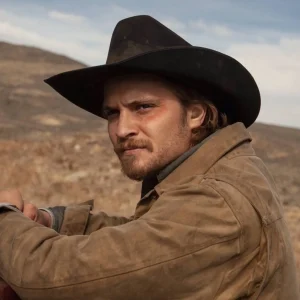Kevin Costner is officially back on the small screen—but this time, he’s trading modern-day ranching for the rugged, blood-soaked soil of American history. While many Yellowstone fans may still be holding out hope for his return as the iconic John Dutton, Costner’s newest project is a deeply compelling alternative. Titled Kevin Costner’s The West, this ambitious new series may not continue Dutton’s personal story, but it absolutely carries on his legacy—this time through the lens of reality rather than fiction.
And make no mistake—this isn’t just another western. The West is a raw, unapologetic, and deeply human exploration of America’s most mythologized era. Narrated and executive produced by Costner, the series sets out to dismantle the romanticism that has long clouded the violent and chaotic rise of the American frontier. For fans of Yellowstone who crave weighty moral dilemmas, intense emotional stakes, and deep-rooted conflict, The West delivers on all fronts—but with historical gravitas that elevates it beyond drama.
A Western Without the Filter
From the moment the series begins, it’s clear that this is not a nostalgic retelling of cowboy legends. Instead, The West plunges into the brutal truths of America’s expansion, spotlighting not only the daring pioneers and determined settlers but also the indigenous people whose lives, cultures, and lands were torn apart in the name of progress.
One harrowing scene in particular has captured national attention: the retelling of abolitionist John Brown’s violent rampage through Pottawatomie, Kansas. In this haunting reenactment, Costner’s narration pulls no punches. We watch Brown and his followers storm homes in the dead of night, delivering justice as they saw it—swift, brutal, and unforgiving. The message is chilling, and it’s delivered with jarring clarity: this was not a time for heroes or villains. It was a time of desperation, of deeply entrenched beliefs clashing in blood-soaked consequence.
More Than Cowboys and Gunfights
What truly sets The West apart is its determination to tell history from every angle. The show doesn’t limit itself to white settlers carving out new beginnings. Instead, it gives voice to the voiceless, placing equal weight on the perspective of Native American tribes who resisted the relentless push into their sacred lands. Their stories are not just acknowledged—they are honored. And that choice alone gives The West the emotional depth and nuance many modern westerns lack.
In one episode, the journey of Lewis and Clark is given new texture—not as a triumphant exploration, but as a complicated collision of cultures. Through the eyes of Sacagawea, the young Shoshone woman who guided them, the expedition becomes something far more layered and intimate. It’s these kinds of perspectives that turn The West into more than a documentary—it’s a reckoning.
Kevin Costner’s Personal Mission
Costner’s fingerprints are on every frame of The West, and his passion for the project radiates through the screen. Working closely with Pulitzer Prize-winning historian Doris Kearns Goodwin, Costner has crafted a series that is not only historically accurate but emotionally gripping. This isn’t just narration—this is storytelling with purpose. You can hear it in his voice, feel it in the pacing, and see it in the uncompromising way the series chooses to confront America’s darkest chapters.
In a heartfelt Instagram post tied to the series premiere, Costner wrote:
“I worked with the brilliant historian Doris Goodwin on this one, and I think you’ll be amazed at some of the very true stories we tell. Stories which, though maybe not widely known, make up the very fabric of the West.”
And that’s exactly what the show delivers—narratives that have too long lived in the shadows of myth and legend. The battles fought, the blood spilled, the policies enacted, and the resistance that followed—it’s all laid bare with searing honesty.
Life After Yellowstone
For many viewers, this series marks a turning point—not just in American television, but in Kevin Costner’s career. After his tumultuous exit from Yellowstone, marked by creative clashes and scheduling conflicts, many feared Costner’s time in the western genre had come to a close. But with The West, he proves there is life—and legacy—beyond the Dutton Ranch.
Yes, fans still mourn the loss of John Dutton. That character became more than a role—it became a symbol of stoicism, grit, and reluctant leadership. But The West expands Costner’s influence from fiction to fact, from the screen to the historical record. This isn’t a retreat from Yellowstone—it’s an evolution.
And let’s not forget, The West isn’t just another credit on his résumé. It’s his first major television project since walking away from the Yellowstone franchise, and it carries a heavy burden: to not only live up to the storytelling mastery that made Dutton a household name, but to surpass it by grounding it in truth.
So far, it’s more than delivering.
The Ripple Effects
The West doesn’t just tell history—it forces us to reflect on our present. The political violence, the racial tensions, the thirst for land, identity, and power—these aren’t just echoes of the past. They’re warnings. They’re stories that continue to shape the country we live in today.
As Costner takes us through a hundred years of American conflict and courage, the series never lets viewers grow comfortable. Every triumph is tinged with cost, every expansion is laced with destruction. It’s that duality—of opportunity and oppression—that gives The West its edge.
And while fans of Yellowstone may have tuned in for Costner’s voice, they’ll stay for the soul of the series. Because at its heart, The West is about more than battles and borders—it’s about people. Their courage. Their mistakes. Their sacrifices. And their stories finally being told.
Final Thoughts
Kevin Costner’s The West may not bring back John Dutton, but it does something even more powerful—it honors the spirit of the American frontier while refusing to shy away from its truths. It’s bold, brutally honest, and emotionally unforgettable.
For fans still mourning the end of Yellowstone, this is your bridge. And for those passionate about history, identity, and the human condition—this might just be the most important western of our time.
Tune in. This is history with a heartbeat.
